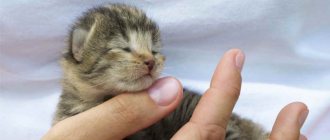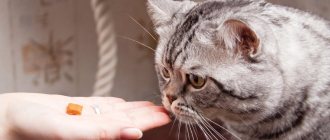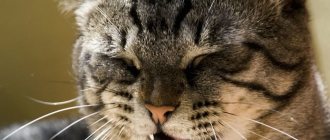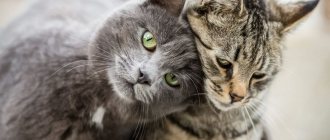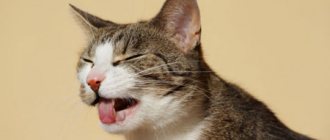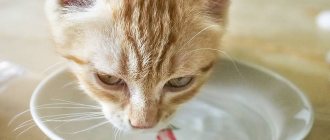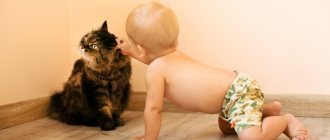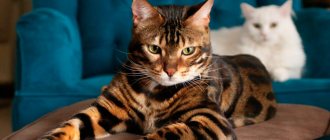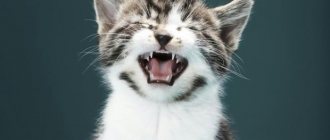The cat is hot and lethargic: what to do
If the pet's body temperature is higher than normal (38-39.5 °C), he has a hot, dry nose, the cat is lethargic, apathetic, trembling, coughing and/or sneezing, perhaps there is an inflammatory process inside him, for example, a cold.
Usually the pet’s body copes with this problem on its own within 24 hours, so during this period it is recommended to provide the cat with rest and plenty of fluids. After the cat feels better the next day, you can give him a light warm broth, and then gradually introduce his usual foods. If an elevated rectal temperature persists for more than 48 hours, you should immediately contact a veterinarian to prevent dehydration. If there is such an opportunity, it is better to invite a doctor to your home so as not to torment the sick animal with transportation.
A high temperature in a cat is most often due to a cold.
If your cat has a fever, hot ears and a dry nose, this could be a sign of ear mites.
In this case, it is recommended to carefully examine the pet’s hearing organs for the presence of plaque, dirt, liquid discharge or squelching, or an unpleasant odor. If the listed signs are identified, you must visit a veterinary clinic, where a specialist will take biomaterial from the cat’s ear and conduct an analysis.
Based on the result, the veterinarian will determine the severity of the infection and prescribe the required treatment.
An increase in body temperature may be a reaction to lichen, which is detected upon careful examination of the pet in the form of bald patches. Treatment of lichen depends on its stage, intensity of infection and the cat’s immunity.
Therefore, when you notice the first symptoms (bald patches, itching, lethargy, increased body temperature), it is important to contact a clinic, where, using a special lamp, they will identify the nature of the lichen and prescribe an effective treatment
The cat twists his bruised paw
The cat is lethargic and sleeps a lot - this could be due to bruises, dislocations or fractures, which are the most common cause for this condition in cats. During sleep, healing processes are accelerated, and pain is practically not felt. To rule out a fracture, it is necessary to take an x-ray in the clinic.
Lethargy and drowsiness of a cat for a short period of time is not a cause for concern. The pet needs to be given time to rest and gain strength. If a lethargic, apathetic state lasts for several days, is accompanied by a number of symptoms, and the cat looks tired and thin, you need to contact a veterinary clinic for a consultation, where an accurate diagnosis will be established based on a visual examination and test results.
Why does the kitten sleep all day?
Sometimes the owner notices that the pet sleeps all day. Or the kitten is active when no one is watching it. This situation is alarming, however, drowsiness is caused by both pathological and physiological reasons.
Physiological reasons
Drowsiness is caused by natural causes:
- Calmness and confidence that the kitten is not in danger. Responsible felinologists believe that it is best to purchase a pet from a breeder after it is 100 days old. By that time, the cat has time to socialize, communicating with its mother and peers, and is accustomed to the litter box. He is vaccinated and has no fleas or worms. Having settled into a new place, he knows that there is no one to be afraid of, so he can get a good night’s sleep.
- Satiety and fatigue from active games. Digestion requires rest, that is, after lunch you can’t jump around and freak out. Therefore, it is better not to get bored, but to sleep and gain strength for new adventures.
- Low atmospheric pressure has a soporific effect on the owner, so why should it have a different effect on the pet?
Be sure to read:
Discharge from the eyes in cats: normal or pathological, causes, what to do, treatment and prevention
Scientists suggest that cats, like humans, are capable of dreaming, during which they squeak and wave their paws. These are good signs, there is nothing to worry about. Just be happy that your pet is growing up healthy and cheerful.
This is not the case with a kitten. purchased before two months of age or picked up on the street. The pet needs to be dewormed, treated for fleas, and vaccinated. Therefore, you need to be patient for a while: the kitten and the owners will have restless sleep.
Pathological causes or when to contact a veterinarian
In a kitten acquired after one hundred days, pathological drowsiness can be explained by injury or poisoning. A pet picked up on the street or purchased unvaccinated has more risks.
Viral diseases and helminthiases are added to those listed above. The animal has restless sleep, it looks depressed, its eyes are sunken, its fur is tousled, its nose is constantly dry. The last sign does not necessarily indicate pathology.
If a lethargic cat does not eat or drink, what should I do?
Often, a pet's refusal to eat can frighten the owner. When a cat is lethargic and spends most of its time in one position, this is certainly not a good sign. If the cat does not eat or drink and only sleeps, it is necessary to understand the reasons for this behavior, because it is quite possible that your cat is sick and needs to be treated.
What does it mean for a pet to refuse food and drink?
There are situations when a cat does not eat or drink for several days, but only sleeps for no reason. If a cat does not eat and therefore loses its appetite, this can be called anorexia. However, an animal's appetite is determined by psychological factors, unlike hunger, which is a physiological phenomenon.
There can be many reasons why a cat does not eat for several days and only sleeps. Often, a kitten does not eat because some harmful processes have begun in its body, that is, a disease is emerging. As a rule, if a cat is lethargic, does not even drink water for a long time and lies in one place for most of the day, then this indicates diseases of the stomach or other main organs. After all, when experiencing severe pain, the animal will not have time to eat.
Note that if the pet is very lethargic during the day and does not even drink water, this may indicate the first heat. Owners think their pet is sick, but this is not the case. In this case, the animal begins to get acquainted with new natural urges, and this can lead it to confusion. This behavior and refusal of water and food may subside within a few days and then return to normal.
If the kitten does not eat anything for a long time and does not even drink water during the day, he is lethargic and does not want to do anything, then your pet is probably sick. Often infectious diseases such as worms are the cause of lack of appetite. To prevent your pet from losing weight and being lethargic, it is necessary
Source
We took him to the veterinarian, and based on palpation they suggested kidney problems. The temperature was 40.5. They injected an antipyretic (analyte mixture)
I wanted to put a catheter on the cat on the 1st and start making a nutritional drip (so as not to torment me with syringes and hunger), the 1st doctor said that there was no need, the 2nd doctor didn’t say anything at all, today the 3rd doctor agreed with me about the need to install a catheter and nutrition. IVs, and 1st still thinks that this is not necessary.
Today we took the first injection of Heptral in the morning at home, 1.3 ml, I vomited white liquid (in the evening we reduced the dose to 0.8 ml after the injection there was no vomiting)
In the evening, I vomited several times with a yellow liquid with foam (the liquid has no bile odor, there is a faint smell of medicine)
Rules, paragraph 5: Post test results in the form of scans or photos. The analysis form must fit on the scan or photo ENTIRELY, and not just those indicators that differ from the norm.
I didn’t catch it, for prevention of what? I don’t understand at all what such a tag is doing in this community, although this can probably be explained.
I am not a doctor. But the only thing I can advise is to already contact (maybe another?) _one_ doctor who can finally make a diagnosis and treat for a specific one. Running from person to person, from appointment to appointment is a waste of the cat’s time and energy for something unknown, and whether or not this time exists, no one knows.
Not vet. Check your teeth. Mine couldn't eat because of tartar. This is where the inflammation came from - the gums, abdominal organs, etc. Of course, it is necessary to treat the inflammation, but first remove the cause.
The diagnosis is to understand between the possibility of intestinal obstruction and the case of acute viral leukemia of cats, both diseases fit the picture and tests.
Exclude obstruction by carefully palpating the abdominal cavity and examining the oral cavity
Source
Why does the kitten eat a lot?
It’s not for nothing that veterinarians strongly advise against taking babies away from their mothers too early. It is advisable that the baby is already 3 months old at that time - this is the best option. If the amount of food consumed by a kitten exceeds the permissible norm, then it is quite possible that the pet lacks some elements contained in mother’s milk.
Among the reasons why a kitten constantly asks for food can be both completely harmless and alarming:
- poor bowel function;
- individual characteristics of nutrient absorption;
- the body's needs during the period of active growth;
- various diseases, for example, diabetes, liver disease;
- use of certain medications;
- climate change (cats eat more in the cold season);
- presence of parasites.
The last reason is perhaps the most common. In this case, the kitten constantly wants to eat, meows pitifully, and screams. He eats a lot, but does not gain weight and has a big belly. With helminthiasis, another clinical picture is possible - the kitten eats little and begins to experience weight loss.
IT'S INTERESTING TO KNOW: How is litter certification carried out?
If your cat has parasites, he needs to be given an anthelmintic drug recommended by a specialist. Deworming is carried out twice, again - 10-14 days after the initial treatment.
What is the reason for the decrease or loss of physical activity?
A decrease in physical activity is one of the typical manifestations of old age. Being young, full of strength and energy, the pet could tirelessly rush around the house, jump on cabinets, readily get involved in various adventures, and take a lively interest in the affairs of the inhabitants of the home. In old age, all this no longer interests him. Now he is more attracted to dozing on a warm bed.
This is normal, because slowing down all processes in the body leads to a decrease in physical activity. An elderly cat gets tired quickly, he simply does not have the strength to frolic like before. However, complete loss of mobility is an alarm bell. It may be a consequence of diseases and pathological conditions characteristic of older cats (arthritis, osteophytes, osteoporosis). If at the same time the cat stops eating and only drinks water, looks depressed, meows pitifully, it should be immediately shown to a veterinarian.
Why is it dangerous to overfeed kittens?
As soon as the baby is taken from the mother, as a rule, this happens no earlier than 2.5-3 months, the responsibility for feeding it falls entirely on its owners. Proper nutrition and a balanced diet are the most important factors in the full development of a pet. At the same time, you need to understand that overfeeding is just as dangerous for a growing body as underfeeding.
INTERESTING TO KNOW: Why you shouldn’t give kittens cow’s milk
The kitten's stomach is still very small and is not able to process large volumes of food, so it needs to be fed in small portions, but often. However, many owners believe that the more you feed your baby, the better for his growing body. This is a dangerous misconception!
A kitten that systematically overeats develops a large belly, which not only prevents it from moving, but can also paralyze the functioning of the digestive tract. A large and hard belly may also indicate that the baby has stool stagnation (constipation) due to overfeeding, which occurs due to a decrease in physical activity. Such kittens are very lethargic, move with difficulty and sleep a lot.
To normalize the digestion process, it is necessary to urgently adjust the diet: limit the number and volume of feedings, switch to high-quality special food for kittens, introduce a sufficient amount of microelements and vitamins into the diet - if preference is given to natural food, good food already contains nutrients in the quantity required for a growing organism.
And, of course, it is very important to provide the baby with sufficient physical activity.
Cat's food needs
It is very important for cat owners to understand that these animals should never fast for more than 18 hours. It's all about the cat's liver
The metabolic processes of the gastrointestinal tract do not stop for a moment, and when the liver enzymes have nothing to break down, they begin to work with the fat that is in the body.
Good cat food
In a cat that starves for a long time, fatty degeneration of the liver (lipidosis) occurs quite quickly, which often leads to the death of the animal. Lipidosis is reversible if noticed in time. This disease can be diagnosed using liver ultrasound and blood tests.
Note! Overweight cats are at risk and are more prone to developing hepatic lipidosis than others.
What diseases can cause
The following diseases can provoke loss of appetite and refusal of water in cats:
- malignant tumors - can be asymptomatic for a long time, most often affecting old animals, which at the same time begin to rapidly lose weight and prefer a sedentary lifestyle;
- renal failure - can occur in a pet at any age, while the cat rarely goes to the toilet, urine is excreted in small quantities;
- helminthic infestations are a common cause of loss of appetite in an animal at any age; in addition, symptoms such as stool disorders, weight loss, hair loss, vomiting, etc. are often present;
- fungal diseases - accompanied by deterioration of appetite, refusal of water, hair loss, skin rashes, itching and a general unsatisfactory condition in which the cat refrains from active games;
- intestinal obstruction - can be the result of stuck hairballs, helminthic infestation, while the pet does not go to the toilet and tries to hide.
Fungal diseases in cats can cause loss of appetite
A friend’s cat suddenly lost his appetite and drank very little. At first she thought it had something to do with the extreme heat. Then the cat began to hide and lost a lot of weight. When I came to visit her and called my pet, he came out of hiding. He was terribly thin and could barely sit. Suddenly I discovered a sore on his withers and a lack of hair in this place. She advised me to immediately contact a veterinarian, as I suspected the presence of a tick. I recommend carefully examining your pets if their appetite worsens and they refuse water. Provoking factors are not always as harmless as they may seem at first glance. Now the cat has almost fully recovered, but long-term therapy is still required.
When you can't put off visiting a doctor
If within three days the cat’s appetite is not restored and it refuses to drink, then it is necessary to urgently consult a doctor, as the risk of dehydration is high.
It is also important to visit a specialist if your animal has the following symptoms:
- vomit;
- hair loss;
- rash;
- loose stools;
- elevated temperature;
- weakness.
The cat is lethargic and sleeps a lot, or the cat is weak
If the cat is lethargic for several days and you do not see any improvement, you should not ignore the situation and should contact a veterinarian or call a veterinarian to your home to identify the disease in the cat in the early stages.
The main diseases of cats and the causes of weakness and lethargy: anemia (low level of red blood cells), blood diseases, diseases of the cardiovascular system, lung diseases, chronic inflammation or infection, lethargy associated with taking medications, metabolic disorders, gastrointestinal diseases, diseases urinary tract, cancer, diseases of the immune system, skin, neurological, nutritional disorders, behavioral disorders, diseases of the skeletal system, infections, poisoning, trauma.
The cat has pale gums
A cat's pale gums or other mucous membranes indicate blood loss or shock. Possible cat illnesses and causes of blood loss or shock are life-threatening. A veterinary examination is highly recommended.
The cat has a temperature, fever
Fever is high body temperature. Doctors believe that high temperature is a way to fight infectious diseases in cats.
If your cat, cat or kitten has a fever, call a veterinarian at home.
The cat is having seizures. What to do?
Seizure or convulsions are a disease in cats that are associated with a brain disorder. Convulsions in a cat can be either in the form of twitching on the face, or when the cat falls on its side, grinds its teeth, urinates under itself, and the muscles of the front and hind legs involuntarily contract. Convulsions in a cat can last a few seconds, several minutes or hours.
Seizures are considered a neurological disorder, i.e. Cramps themselves are a symptom, not a disease.
The cat has red eyes
- Red eyes in a cat, cat, or kitten are not a specific symptom of an inflammatory process or infection in the body. The symptom of red eye is observed with several different diseases that can be in different parts of the eye.
- For example, the following diseases of cats: inflammation or infection can be in the eyelid area, third eyelid, mucous membrane of the eye, cornea, sclera (white membrane of the eye). Inflammation of the eye can also be inside the eye itself (for example: glaucoma (high pressure inside the eye)) or the eye socket. Also, a cat’s eyes can be both red or separately.
- It all depends on the illness of the cat. Red eyes can either be a sign of a serious illness or require minimal veterinary intervention.
Cough. Cat, cat coughing
Coughing in a cat is very rare.
Causes of cough and possible cat diseases: airway obstruction, bronchitis, pneumonia, heart disease, lung cancer, heart disease. All of the above causes and diseases of cats are dangerous to the life of the animal. If your cat has a cough, he needs to be examined by a veterinarian.
Poisoning
One of the most common reasons why a cat drools is poisoning. Moreover, we are not necessarily talking about stale products, which the pet is unlikely to get at home (but it’s easy to pick up some nasty stuff on the street). A cat can be poisoned by medications, flea treatment if used incorrectly, household chemicals, chocolate, and other food that is not intended for the stomach of a small predator.
When poisoned, a cat drools heavily, experiences vomiting and diarrhea, emetic convulsions, increased thirst, weakness, and a rise in temperature. In severe cases, fever, convulsions, paralysis develop, and the pupils are dilated (in case of poisoning with pesticides, mercury, etc.).
Avoiding food and water if your nose is dry
Normally, a cat's nose should be cool and slightly damp. But even if it has warmed up slightly, this is not a cause for concern. If the cat just woke up, was actively playing or came in from cold air, a warm nose is a completely natural phenomenon.
But a dry nose combined with apathy and complete refusal to eat is an alarming signal. The cat may have a cold or injury; inflammation or frostbite of the ears with such symptoms also occurs.
It is necessary to conduct an emergency examination at home
What to pay attention to first:
- Integrity of the skin – paws, fur, mouth, eyes. Injuries received through contact with street brethren can introduce a dangerous infection into the blood.
- Ears and nose without foreign mucus - these organs are susceptible to frostbite and colds. If the cat shows aggression when examining the ears, growls and breaks out sharply, then the ears are cold or the soft tips are damaged.
- The frequency of breathing and its quality - the presence of wheezing or rapid breathing - is a signal for an early visit to the veterinarian.
If you detect alarming calls, do not be lazy to take care of your pet and call a doctor or pay him a visit yourself.
Natural Causes of Lethargy
The reasons for a lethargic, apathetic state can be simple and banal. For example, a similar reaction is possible to a change in weather. Most cats are more sensitive to changes in atmospheric pressure and the change from warm to rainy weather with gusts of wind compared to weather-sensitive people. But unlike people, a cat cannot say that it doesn’t feel well or take a pill to normalize its blood pressure. That is why she becomes lethargic, sad and phlegmatic, tries to sleep more and eat less, which is why she seems tired to her owner.
Lethargy in a cat can indicate many reasons for this condition.
You should not force a cat to play or eat; such behavior on the part of the owner can provoke aggression and resentment in the cat. As soon as the clouds clear and the bright sun appears, the pet’s mood will normalize, and she will again become playful and active.
Note! Cats also become drowsy and lethargic during extreme heat; this is how pets save themselves from overheating and dehydration. In the heat, cats want to drink a lot and exercise little
Lethargy and drowsiness in a kitten can be a result of boredom. A person has dozens of ways to overcome boredom, but a cat closed within four walls cannot boast of such a variety. For example, if your pet sleeps all day, you need to unobtrusively involve him in playing with one of his favorite toys. If the kitten immediately jumped up and began to play, it becomes clear that he was sleeping, because he had nothing to do. If the kitten lies lethargic and does not respond to play or favorite treats, despite a sunny, fine day outside, it is better to consult a specialist.
Lethargy and drowsiness overcome many cats 3-4 days after sterilization, the first weeks of pregnancy, during which they refuse to eat due to toxicosis. A similar reaction of the body may occur to vaccinations, medications, or anesthesia after surgery. It is worth considering the age of the pet. Weakness in an older cat is normal, because older cats are less active and mobile than younger cats.
The kitten is sleeping because he is bored
How long does a cat sleep at 2 months?
By nature, the cat is a big sleepyhead. An adult cat can sleep up to 18 hours a day. What then about the little one, who only recently got into the house of new owners?
The most common age when kittens are given to a new family is 2 months. During this period, the tailed animal is actively developing, gaining weight, and spending a lot of energy. All these features affect his daily routine.
A normal, healthy kitten needs to sleep, eat, and play. Up to 2 months, this process is controlled by the mother cat. But from the moment of moving, this responsibility falls on the shoulders of the owner.
Typically, a kitten sleeps 6-9 times in 24 hours. In total, a 2-month-old kitten should sleep 20 hours. This is exactly what a young body requires.
However, the mode may be different. It all depends on temperament, breed and habits. But even in this case, the cub must sleep at least 18 hours.
© shutterstock
Most of the day is spent sleeping and feeding. At 2 months, the baby eats up to 5-6 times a day , after which, as a rule, he falls asleep for 2-3 hours. Entertainment and other active pastimes take about 4 hours.
In fact, at 2 months the baby wakes up only because of the feeling of hunger. If the animal is full, then it falls asleep.
Long sleep: normal or pathological?
In general, only a veterinarian can make conclusions about a pet’s health. Perhaps the cat is sick, and sleep is a consequence of malaise, weakness and loss of strength.
A kitten, a small cat sleeps all the time and this is normal. Her sleep may be interrupted by short games and food. At the same time, during rest, he can twitch his paws and squeak quietly. Don't worry, these are signs of emotionality experienced during the day's events.
Experts believe that the number of hours a pet naps and sleeps is greatly influenced by weather conditions. Since thermoregulation is important for animals, in the summer, especially on hot days, the rest period may increase and it will seem that the cat is sleeping all day.
A combination of drowsiness and lack of appetite should alert you. Then you definitely need to take your pet to the vet.
In general, long-term sleep is normal for cats, as long as there are no obvious behavioral abnormalities or problems with appetite or bowel movements during wakefulness.
Can a cat sleep with its owner?
The cat can sleep with its owner. This is completely acceptable. Having a pet can benefit your health. Cats are a natural source of warmth, reduce stress and provide a sense of security. Studies have shown that people sleep better and more peacefully when they have a cat in bed with them. Monitor your cat's health if you regularly take her into your bed.
In 20-30 years, the Earth's temperature may reach a critically high level
The Japanese have found an unusual way to protect against Covid - a 7-meter straw gorilla
Three warty pigs: the oldest animal cave painting found
